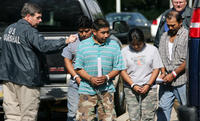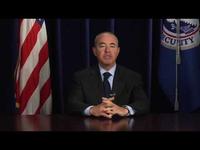-
CBP unveils measures to address use of force along the border
Stung by criticism that its agents are using excessive force along the U.S.-Mexico border – including the conclusions of DHS IG that many CBP officers and Border Patrol agents do not understand their agency’s rules about the use lethal force — Customs and Border Protection (CBP) on Wednesday unveiled measures it said would address the problem.
-
-
More Americans see their electronic equipment seized by DHS at the border
The American Civil Liberties Union (ACLU) has released details of an investigation showing how U.S. law enforcement and other agencies exceed their powers in the name of homeland security. The ACLU points to the practice of the U.S. border agents searching and seizing the electronic devices of Americans at the border. Public data shows that more Americans are having their electronic devices searched.
-
-
Border communities decry Washington’s misguided emphasis on border security
Billions of dollars have been spent in an effort to secure the U.S.-Mexico border. Many border communities see investment in cross-border commerce, rather than spending money on fences and patrol agents, as a better way to reduce crime and illegal immigration. “We don’t need more Border Patrol agents — we need more customs agents,” says El Paso mayor John Cook.
-
-
Business demand for temporary visas, green cards to rise in 2014
In its newly released 2013 Annual Business Immigration Survey, the Global Immigration Benchmarking Council (GIBC) reports that business demand for temporary visas and green cards continues to rise. Thirty-four percent of companies anticipate hiring more H-1B visa holders in the year ahead, while 25 percent of companies anticipate hiring additional H-2A or H-2B workers.
-
-
California granting driver's licenses to illegal aliens threatens homeland security: critics
Last Thursday night’s approval of AB 60 by both houses of the California Legislature, granting driver’s licenses to illegal aliens, poses a serious threat to the security of all Americans, critics charge. The critics say that in 2005, in response to recommendations by the 9/11 Commission, Congress enacted the REAL ID Act in order to discourage state governments from issuing driver’s licenses and other identity documents to illegal aliens – and that California’s AB 60 is designed to circumvent requirements of REAL ID Act.
-
-
Senior U.S., Canadian government officials to gather at US/Canada Border Conference
For two days on 12-13 September, Detroit’s renovated Cobo Center will be host to a gathering of U.S. and Canadian border security officials and industry professionals meeting to discuss a myriad of important issues relating to border protection and facilitation of legitimate trade and travel between the United States and Canada.
-
-
What you haven’t heard about immigration reform and border security

The Senate and House must find a way to resolve our current immigration dilemmas. We owe a fairer, more just system of laws to all our immigrants, both illegal and legal. And, yes, we must find ways to address issues of national security as well. It’s not going to be easy to shape such legislation, but we should demand no less from both Democrats and the Republicans.
-
-
More resources allocated to border security without a clear measure of effectiveness

Billions of tax-payer dollars have been spent to secure the U.S-Mexico border from illegal immigration and drug trafficking. Yet, according to two federal oversight agencies, it is not clear whether the investments made are providing a favorable return. More importantly, there is no mechanism to measure the effectiveness or success of the investments made to secure the border.
-
-
Immigration reform bill would add 13,992 jobs per congressional district
The Senate’s immigration bill would add, on average, 13,992 new jobs in each congressional district in the United States over the next decade. This is one of the findings of an analysis offered by the conservative American Action Network (AAN). The group supports the reform of the U.S. immigration law and is active in the effort to persuade GOP House members to support the Senate immigration reform bill.
-
-
DHS takes control of Arizona border blimp, grounding it for repairs

A 208-foot long white blimp has been floating two miles above Yuma Proving Ground, Arizona, using radar continuously to scan the area along the border, looking for low-flying aircraft drug smugglers use to bring drugs into the United States. The sensors on board can detect activity in distances of up to 230 miles. The blimp, had been operated by the U.S. Air Force, but DHS has now assumed responsibility for it. It is one of eight aerostats deployed along the U.S. southern border.
-
-
The administration does not follow its own deportation criteria

The Obama administration has set a record for deporting illegal immigrants, but the administration’s declared policy is to concentrate on criminals and other illegal immigrants who pose a risk. Yet, the administration has also been deporting immigrants who are not top priority according to the administration’s own criteria, and who may be eligible for legal residency if Congress reforms immigration law.
-
-
Immigration reform should consider families, social ties: study
Immigration judges should be allowed to consider a person’s family and social ties to the United States before ordering the deportation of legal permanent residents for minor offenses, says a new study. The study aso found that 98 percent of all deportees are sent to Latin America and the Caribbean even though people from those countries do not make up 98 percent of all immigrants.
-
-
DHS tentatively grants asylum to seven Mexicans
DHS has tentatively granted asylum to seven Mexican immigrants. Some of the immigrants were previously living the United States illegally, but left and tried to re-enter as part of a protest against the U.S. deportation policies, and in support of granting citizenship to immigrants who were to the United States as children.
-
-
Court declares Hazleton, Pa. immigration ordinances unconstitutional
In 2006, the town of Hazelton, Pennsylvania, passed ordinances which denied licenses to businesses which knowingly hire undocumented workers and fined landlords who rented apartments to illegal immigrants. The ordinances have been emulated by several other states and cities since. On Friday, an appeals court declared the ordinance unconstitutional: “The ordinances disrupt a well-established federal scheme for regulating the presence and employment of immigrants in the U.S.,” Judge Munley wrote, adding that such ordinances violate the Supremacy Clause of the U.S. Constitution.
-
-
GOP lawmakers boycott DHS nominee hearing

Senate Republicans boycotted a hearing last Thursday to consider President Obama’s nominee for deputy DHS secretary. Senate Homeland Security Committee chairman Tom Carper (D-Delaware) refused a request by GOP lawmakers for a delay in the hearing because of concerns about Alejandro Mayorkas, the current head of the U.S. Citizenship and Immigration Services (USCIS) agency. Mayorkas is under DHS IG investigation for authorizing an EB-5 investor visa to a Chinese businessman who was supposed to invest in a green-tech car company founded by Terry McAuliffe, the current Democratic candidate for the Virginia governorship, and represented by Anthony Rodham, Hillary Clinton’s brother. The visa application had been twice denied by USCIS before Mayorkas’s intervention.
-
More headlines
The long view
Social Acceptance of Immigrants Working as Politicians or Judges Is Low
Often, the dominant society develops negative attitudes towards immigrants and their descendants because their integration is too successful – and not because they are unwilling to integrate. A possible explanation for negative attitudes towards successful immigrants could be the dominant society’s fear of immigrants occupying influential and value-based occupations. This applies, for example, for immigrants working in local politics or law.
